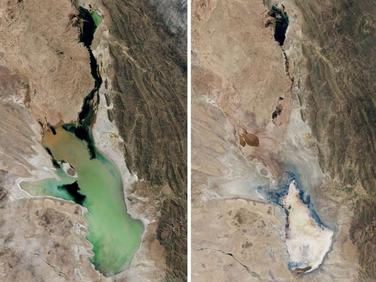|
The World Health Organization declared the mosquito-borne Zika virus a global public health emergency on February 1. Spreading in the Americas, the mosquito-borne disease has been associated with microcephaly in newborns. Read Georgetown professor John McNeill's thoughts on the ecology of mosquitoes and disease in the Americas in this CNN article. Lake Poopó, Bolivia's second-largest lake, has dried up for the second time since 1990. Now over one month into the rainy season, water has yet to return. The lake is particularly exposed to climatic fluctuations due to its very shallow depth (9 feet). “I don’t think we’ll be seeing the azure mirror of Poopó again. I think we’ve lost it,” one Bolivian scholar told the Associated Press. Genetic mapping confirms that the parasite causing schistosomiasis was first carried from Africa to the Americas in the bodies of African slaves, further evidence of an environmental history of slavery. "Comparing the S. mansoni genomes suggests that flukes in West Africa split from their Caribbean counterparts at some point between 1117AD and 1742AD, which overlaps with the time of the 16th-19th Century Atlantic Slave Trade," Professor Joanne Webster of Imperial College London and the Royal Veterinary College said. "During this period more than 22,000 African people were transported from West Africa to Guadeloupe by French slave ships, and the fluke was carried with them."
On Suffolk's North Sea coast, Researchers are using ultrasound to map the submerged town of Dunwich. Once one of eastern England's largest ports, Dunwich was claimed by the sea during a succession of major storms in the 13th and 14th centuries. Weaving together the history of the town, "you get this 900-year story of a coastal settlement being affected by climate change," the lead researcher told the Washington Post. (BBC Documentary, UK only) From tiny St. Helena to continental Australia, islands have long offered valuable case studies of invasion ecologies to environmental historians. In the Channel Islands off California, this history heads for an unpredictable conclusion: environmentalists there have nearly completed, after many years of hunting, a wild sheep chase and a wild turkey shoot. Speaking of islands, new archaeological research in Malagasy caves suggests that anthropogenic forces and ungulate irruption drove deforestation in Madagascar 1000 years ago. According to Professor David McGee, "We went in expecting to just tell a climate change story, and were surprised to see a huge carbon isotope change... Both the speed at which this shift occurred and the fact that there's no real climate signal suggest human involvement." The full study, which examined stalagmites, was published this month in Quarternary Science Reviews (Paywall). Elephant unemployment is on the rise in Myanmar. Image: NASA Earth Observatory via The Independent
0 Comments
Leave a Reply. |
EH@G BlogArticles written by students and faculty in environmental history at Georgetown University. Archives
May 2020
Categories |


 RSS Feed
RSS Feed